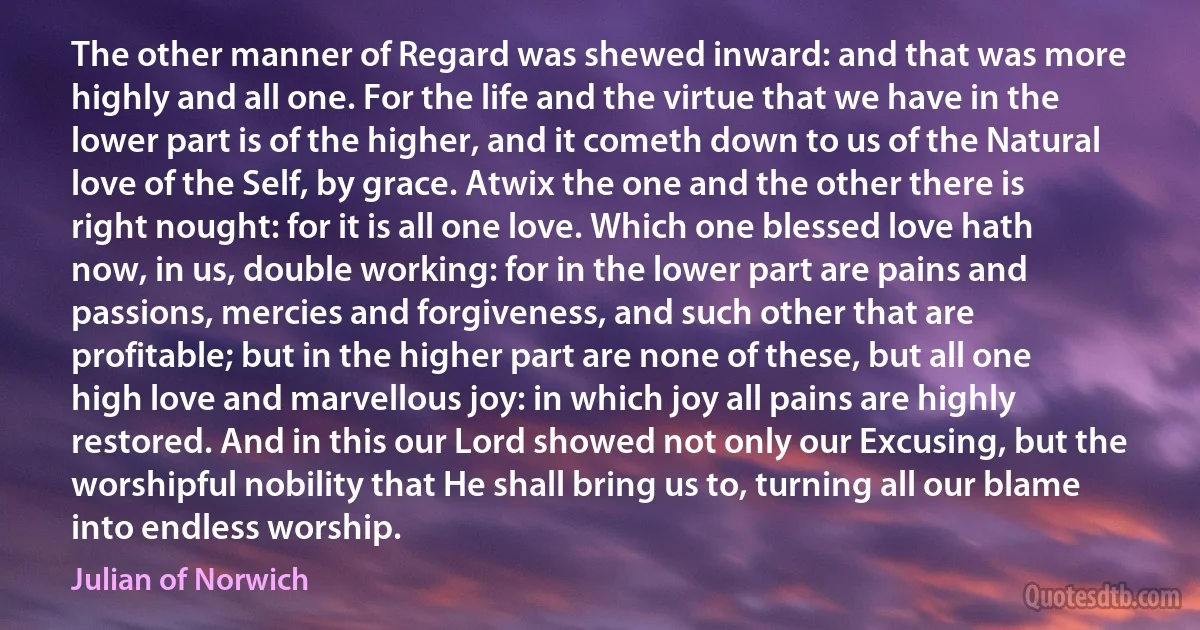
The other manner of Regard was shewed inward: and that was more highly and all one. For the life and the virtue that we have in the lower part is of the higher, and it cometh down to us of the Natural love of the Self, by grace. Atwix the one and the other there is right nought: for it is all one love. Which one blessed love hath now, in us, double working: for in the lower part are pains and passions, mercies and forgiveness, and such other that are profitable; but in the higher part are none of these, but all one high love and marvellous joy: in which joy all pains are highly restored. And in this our Lord showed not only our Excusing, but the worshipful nobility that He shall bring us to, turning all our blame into endless worship.
Julian of NorwichRelated topics
blame double grace high joy life lord love lower natural nobility none nought now pains right self turning virtue working worship higherRelated quotes
It may be observed, that provinces amid the vicissitudes to which they are subject, pass from order into confusion, and afterward recur to a state of order again; for the nature of mundane affairs not allowing them to continue in an even course, when they have arrived at their greatest perfection, they soon begin to decline. In the same manner, having been reduced by disorder, and sunk to their utmost state of depression, unable to descend lower, they, of necessity, reascend; and thus from good they gradually decline to evil, and from evil again return to good. The reason is, that valor produces peace; peace, repose; repose, disorder; disorder, ruin; so from disorder order springs; from order virtue, and from this, glory and good fortune.

Niccolò Machiavelli
Here I saw a part of the compassion of our Lady, Saint Mary: for Christ and she were so oned in love that the greatness of her loving was cause of the greatness of her pain. For in this I saw a Substance of Nature's Love, continued by Grace, that creatures have to Him: which Kind Love was most fully shewed in His sweet Mother, and overpassing; for so much as she loved Him more than all other, her pains passed all other. For ever the higher, the mightier, the sweeter that the love be, the more sorrow it is to the lover to see that body in pain that is loved.
And all His disciples and all His true lovers suffered pains more than their own bodily dying. For I am sure by mine own feeling that the least of them loved Him so far above himself that it passeth all that I can say.

Julian of Norwich
The Second came to my mind with contrition; Freely desiring that sickness so hard as to death, that I might in that sickness receive all my rites of Holy Church, myself thinking that I should die, and that all creatures might suppose the same that saw me: for I would have no manner of comfort of earthly life. In this sickness I desired to have all manner of pains bodily and ghostly that I should have if I should die, (with all the dreads and tempests of the fiends) except the outpassing of the soul. And this I meant for I would be purged, by the mercy of God, and afterward live more to the worship of God because of that sickness. And that for the more furthering in my death: for I desired to be soon with my God.

Julian of Norwich
Our feeling of ignorance, vanity, want, weakness, in short, depravity and corruption, reminds us ... that in the Lord, and none but He, dwell the true light of wisdom, solid virtue, exuberant goodness. We are accordingly urged by our own evil things to consider the good things of God; and, indeed, we cannot aspire to Him in earnest until we have begun to be displeased with ourselves. For what man is not disposed to rest in himself? Who, in fact, does not thus rest, so long as he is unknown to himself; that is, so long as he is contented with his own endowments, and unconscious or unmindful of his misery? Every person, therefore, on coming to the knowledge of himself, is not only urged to seek God, but is also led as by the hand to find him.

John Calvin
Ye see yon birkie, ca'd a lord,
Wha struts, an' stares, an' a' that;
Tho' hundreds worship at his word,
He's but a coof for a' that:
For a' that, an' a' that,
His ribband, star, an' a' that:
The man o' independent mind
He looks an' laughs at a' that.
A prince can mak a belted knight,
A marquis, duke, an' a' that;
But an honest man's abon his might,
Gude faith, he maunna fa' that!
For a' that, an' a' that,
Their dignities an' a' that;
The pith o' sense, an' pride o' worth,
Are higher rank than a' that.
Then let us pray that come it may,
(As come it will for a' that,)
That Sense and Worth, o'er a' the earth,
Shall bear the gree, an' a' that.
For a' that, an' a' that,
It's coming yet for a' that,
That Man to Man, the world o'er,
Shall brothers be for a' that.

Robert Burns
